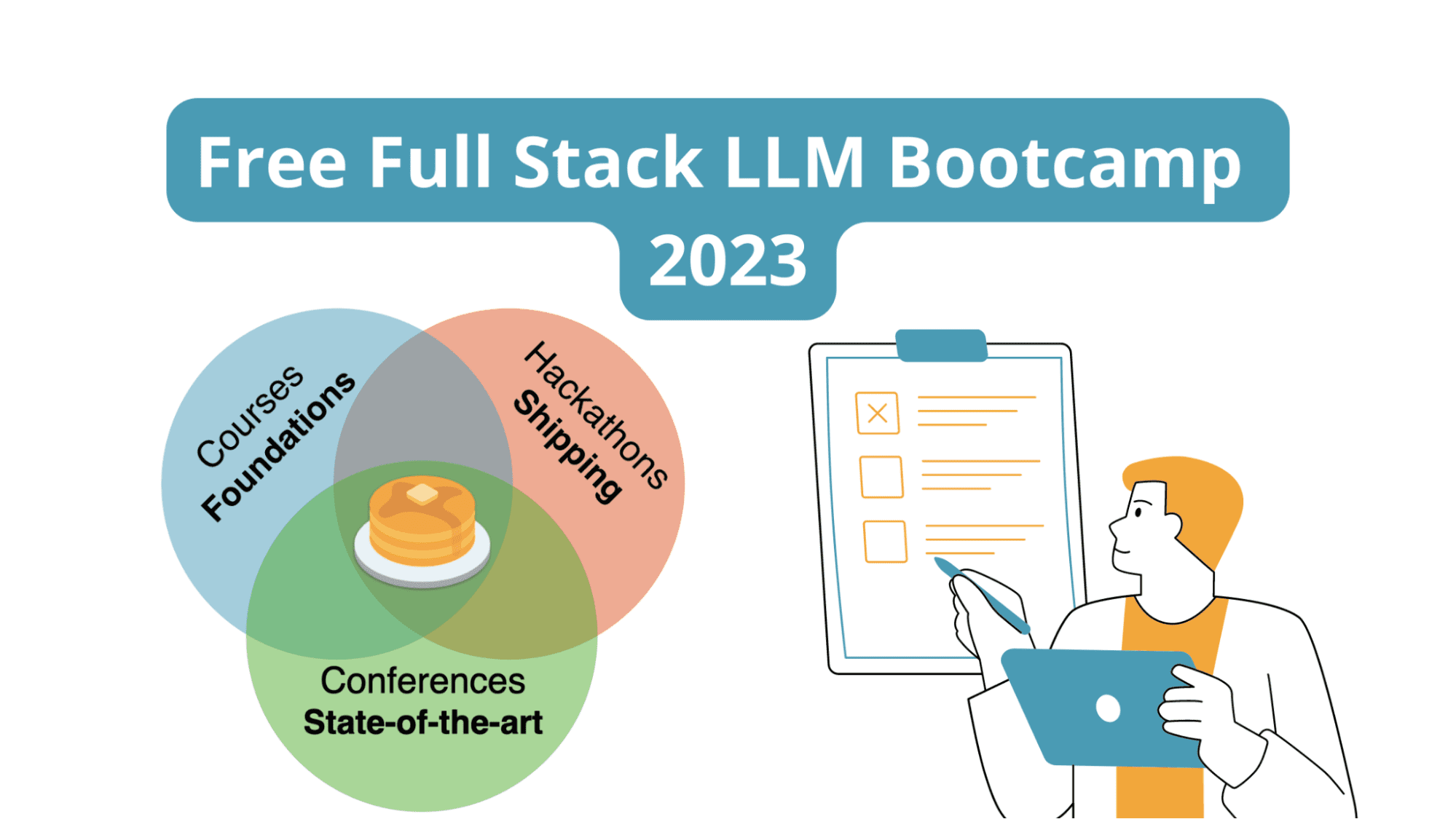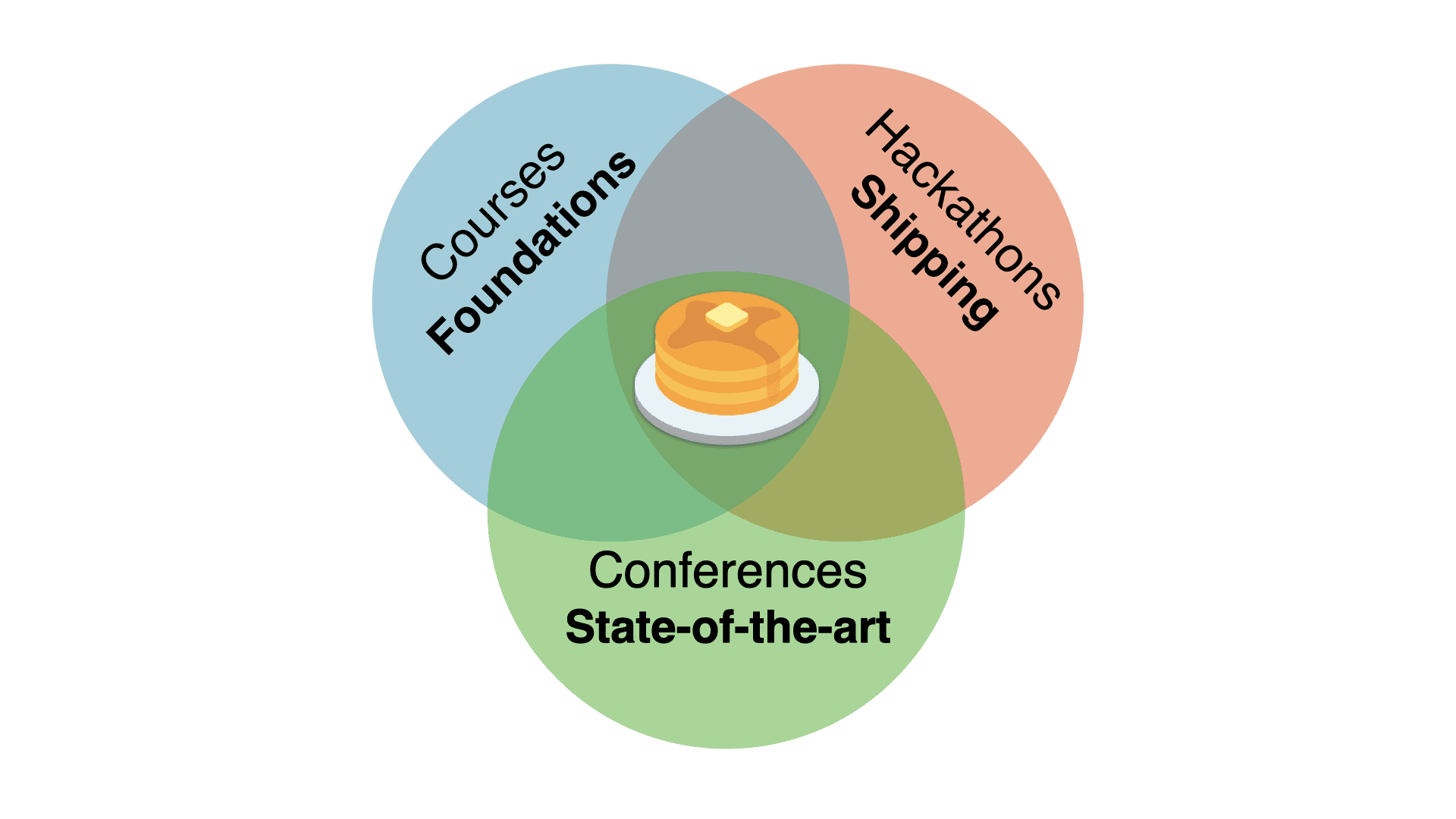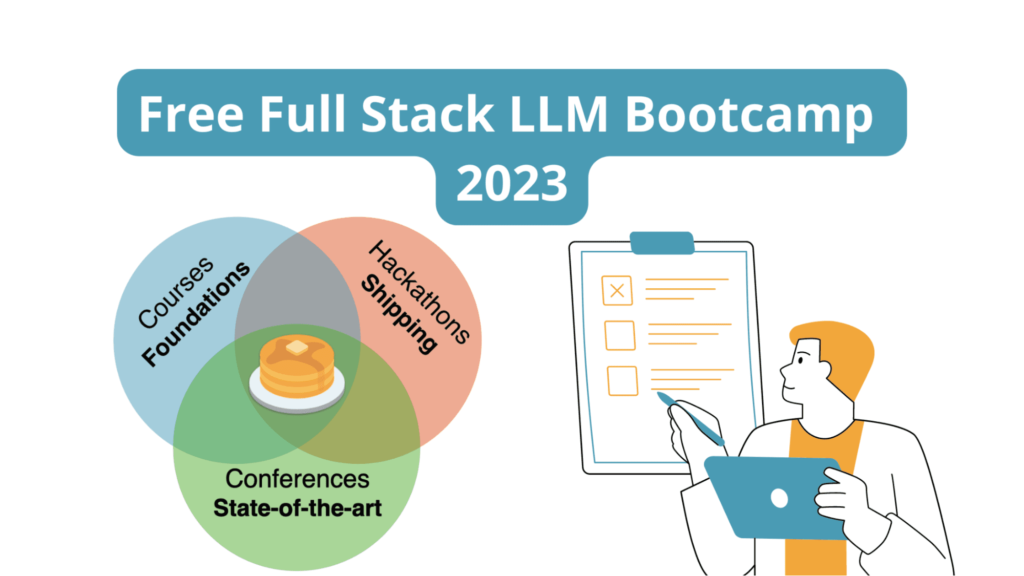[ad_1]

Image by author
Great Language Models (LLMs) and LLM applications are the talk of the town! Whether you’re interested in learning them for personal projects, using them to increase productivity at work, or quickly summarizing search results and research papers—LLMs offer something For everyone across the spectrum.
Cool! But if you want to improve use LLMs and just go for it using These apps and start creating your own, free LLM Bootcamp The full stack team is here for you.
From agile engineering to effective use of LLMs, to building your own apps and designing optimal user interfaces for LLM apps, this bootcamp covers it all. Let’s find out more about what bootcamp has to offer.
The Full Stack LLM Bootcamp was originally taught as a private event in San Francisco in April 2023. And now, materials from the bootcamp – lectures, slides, project source code – are available for free.

LLM Bootcamp | image source
The LLM bootcamp aims to provide a well-rounded approach. It covers agile engineering techniques, the basics of LLMs, building and shipping LLM applications to production.
This bootcamp is taught by instructors Charles Fry, Josh Torbin, and Sergey Karaev, who are all UC Berkeley graduates. And their goal is to make everyone aware of the latest LLM achievements:
“Our goal is to provide you with 100% state-of-the-art technology and ready to build and deploy LLM applications, no matter what level of machine learning experience you have.” – Full stack team
Now that we know what the LLM bootcamp is all about, let’s dive into the course content.
prerequisites
Although there are no mandatory prerequisites – other than a genuine interest in studying LLMs, some programming experience can ease your journey. Here are some such prerequisites:
- Python programming experience
- Familiarity with machine learning, front-end or back-end development would be beneficial
Spell Learning: Rapid Engineering
In order for language models to produce the desired results, it is important that they are better on demand.
The Spell Learning: Rapid Engineering The module includes the following:
- Probably thinking about LLM results
- Demand fundamentals in pre-trained models such as GPT-3 and LLaMa, instruction-driven models such as ChatGPT, and agents imitating personas
- Agile engineering techniques and best practices such as decomposition, assembling results from different LLMs, using randomness, and more
LLMOps
Let alone LLM applications, even for simple machine learning applications, model building is only the tip of the iceberg. The real challenge lies in implementing and monitoring the model in production and maintaining its performance over time.
The LLMOps The bootcamp module includes:
- Choosing the best LLM for your application based on speed, cost, configurability, and availability of open and limited licenses
- Better request management by integrating fast tracking into the workflow (using Git or other version control systems)
- Testing LLMs
- Challenges of implementing test-driven development (TDD) in LLM apps
- Assessment metrics for LLM
- Monitor performance metrics, collect user feedback and make necessary updates
UX language for user interfaces
In addition to focusing on infrastructure accounting and model selection, the success of an application depends on the user experience.
The module is enabled UX for language user interfaces includes:
- Design principles for human-centered and empathetic design and product interfaces
- Accounting for convenience factors such as auto-completion, low latency, and more
- Case studies dive deeper into what works (and what doesn’t)
- The importance of UX research
Enhanced language models
Enhanced language models are at the core of all LLM-powered applications. Often, we need language models to have better reasoning capabilities, work with custom data sets, and use the latest information to answer questions.
The module is enabled Enhanced language models Includes concepts:
- Finding information through artificial intelligence
- All about embedding
- Chaining LLM calls to a multilingual model
- Effective use of tools such as LangChain
Launch an LLM application in under an hour
This module teaches you how to quickly create LLM applications, including:
- Prototyping, iteration, and deployment processes are underway to build an MVP application
- Using different technical frameworks to create a useful product: from OpenAI language models to using server infrastructure
LLM Foundations
If you are interested in understanding the basics of the great language models along with the advances over the years, LLM Foundations The module will help you learn the following:
- Fundamentals of Machine Learning
- Transformers and attention
- Important LLMs such as the GPT-3 family of LLMs and LLaMA are important breakthrough elements
Project progress: askFSDL
The bootcamp also has a dedicated section that teaches you about the askFSDL project, an LLM-powered application built on the corpus of the Full Stack Deep Learning course.
The team’s Full Stack Deep Learning course is another great resource for learning best practices for building and deploying deep learning models to production.
From data collection and cleaning, ETL and data processing steps, to building the front and back ends, to deploying and setting up model monitoring—it’s a full-stack project that you can iterate on and learn a lot along the way.
Here’s an (unfinished) overview of what the project uses:
- OpenAI’s LLMs
- MongoDB for storing the sanitized document corpus
- FAISS index for faster searching of the corpus
- LangChain LLM for connecting calls and quick management
- Application backend hosting on Modal
- Model monitoring with Gantry
We hope you are excited to learn more about LLMs by working through the LLM bootcamp. Happy learning!
You can also interact with other students and community members by joining this Discord server. There are invited talks from industry experts (such as OpenAI and Repl.it) and tool developers in the LLM space. These talks will also be uploaded to the bootcamp website soon.
Interested in checking out other LLM courses? Here is a list of the best free courses on LLMs.
Bala Priya C is a developer and technical writer from India. He enjoys working at the intersection of mathematics, programming, data science, and content creation. His areas of interest and expertise include DevOps, data science, and natural language processing. She loves reading, writing, coding, and coffee! He is currently working on learning and sharing his knowledge with the developer community by authoring tutorials, guides, reviews, and more.
[ad_2]
Source link

